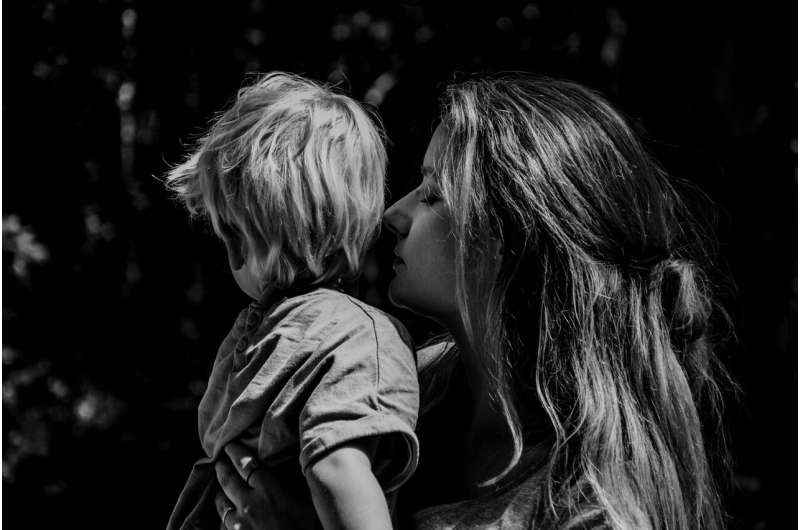Post-traumatic pain expressed physically from generation to generation

Adults who have suffered childhood trauma exhibit a higher degree of somatization (i.e., mental suffering expressed through physical complaints that may lead them to consulting a physician). What happens in the parent-child relationship when these traumatized individuals become parents? Researchers from Lausanne University Hospital (CHUV), the University of Geneva (UNIGE) and the Synapsy National Centre of Competence in Research analyzed the links between the post-traumatic stress disorder of mothers exposed to domestic violence and the severity of their—and their offspring's—somatization.
Published in the journal Frontiers in Psychiatry, the study reveals that the severity of a mother's somatization during her child's infancy predicts the child's somatization at school age. This information about the inter-generational transmission of somatization underlines the importance of factoring in the parent-child relationship during pediatric consultations.
A number of studies suggest a link between somatization in children and in their parents. For example, children with early attachment disorders express more physical pain if their mothers show little maternal sensitivity. "These studies suggest that the inter-generational link between a mother's somatization and her child's should be explored in greater detail so we can understand the potential impact of the family history on the child's mental health," begins Daniel Schechter, deputy physician in the University Child and Adolescent Psychiatry Service (SUPEA) in CHUV's Department of Psychiatry, associate professor at UNIL and a researcher at the Synapsy National Centre of Competence in Research.
A mother's trauma impacts the mother-child relationship
The study by Professor Schechter and his team focused on 64 mother-child pairs, where the mothers were suffering from post-traumatic stress disorder (PTSD) in response to a history of adult domestic violence, often following physical or sexual abuse and exposure to family violence during their own childhood. "Unfortunately, interpersonal violence is much more frequent than one would expect in Switzerland, and has been shown to have increased worldwide during the COVID-19 health crisis," says Professor Schechter.
The research team first assessed the link between mothers' PTSD and the severity of their own somatization when their children were between one and three years old. "Early childhood is an important period for impact of the mother-child relationship on the child's development of emotion regulation," continues Professor Schechter. The results of the study show that mothers with PTSD are more likely than others to complain of physical complaints that do not result from any detectible medical problem, "which probably has an impact on their interactions with their children, in particular their ability to interpret their non-verbal communication including their emotional expressions," notes the psychiatrist .
To understand the impact on the child's mental health, the researchers saw the mother-child pairs five years later, when the children had reached school-age, i.e. averaging around seven years. The child's somatization was then measured using a symptom questionnaire filled in by the mother and a clinical interview with the child. The study indicated that the severity of maternal somatization during their offspring's early childhood predicts the child's somatization when he or she is of school-age.
The importance of knowing the family history
The results suggest that there is an inter-generational transmission of somatization during the early formative development of the child; in other words, an expression of psychological distress via somatic complaints is transmitted from mother to child. The mother's trauma and related psychopathology have an effect on the parent-child relationship.
"During a consultation," says Professor Schechter, "if the pediatrician, doesn't find any physiological reasons for the physical complaints expressed by the children, they'll inevitably think it may be a manifestation of somatization due to stress or anxiety. However, if the child's somatization occurs in the context of the mother's posttraumatic stress, then the mother may tend to misinterpret the child's psychic pain and may even reject the pediatrician's diagnosis. To improve patient care in these cases, our results suggest that pediatricians should consider the history of family trauma, since it is often not expressed through words, but through the body."
More information: Jennifer Glaus et al, Families With Violence Exposure and the Intergenerational Transmission of Somatization, Frontiers in Psychiatry (2022). DOI: 10.3389/fpsyt.2022.820652


















